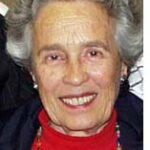By Eileen Wingard

LA JOLLA, California — A beautiful way to prepare for Pesach is by listening to the melodies that will accompany our seder rituals. At 2 p.m. on Thursday afternoon, April 3, in the Astor Judaica Library of the Lawrence Family JCC, we will be doing that, featuring a free program of recorded Pesach music.
I will be hosting the Treasures from the Music Collection: Pesach Music, and share the playlist’s introductions with my special guest, Cantor Lori Wilinsky Frank, Cantor Emeritus of Temple Beth Shalom of Poway.
Cantor Frank received her BA in Judaic Studies and Music from SUNY at Albany and completed the cantorial certification program from Hebrew Union College. She continues as an active member of the American Conference of Cantors and recently returned from singing with them in Buenos Aires, Argentina.
Her sweet soprano voice and vibrant personality have inspired her congregants, adults and students alike. She served for served 40 years, from 1982-2022, as founding Cantor and co-spiritual leader of Temple Adat Shalom and was involved not only in a diverse music program but in all aspects of congregational life. She was also an active member of the Poway Interfaith Team and directed its annual Interfaith Thanksgiving Service for over two decades.
Cantor Frank will introduce the first three selections on the playlist, beginning with Cantor Paul Zim chanting the traditional Holiday Kiddush (blessing over the wine).
Next, we will hear two versions of the “Ma Nishtana (Why is this different),” the four questions posed by the youngest child, one tune from my childhood and the one most popular today.
“Avadim Hayinu (We were Slaves),” the opening words of the answer to the four questions, followed by “B’tset Yisrael (When Israel Departed),” and “Dayenu (It would have been sufficient),” are all from the first half of the seder.
To mark the arrival of the prophet, during the second half, we will hear “Eliyahu (Elijah),” and a more recent addition to many seders, since adding Miriam’s cup, Debbie Friedman’s “Miriam’s Song,” sung by the composer. We will have some tambourines on hand in case the words, “And the women, dancing with their timbrels, followed Miriam,” inspire some to dance.
The seder’s final song, “L’shana Haba’ah (Next Year in Jerusalem),” will be followed by the post seder songs, “Chad Gadya (One only kid),” and “Adir Hu (Great is He).”Another song often sung in recent years at American seders is the Spiritual, “Go Down Moses.” This, interestingly, will be heard sung by the Moscow Male Jewish Cappella.
From another tradition, that of the Beta Israel from Ethiopia, we will hear a “Prayer for Pesach,” with chorus and drum on an old recording where they are referred to as Falashas.
One of the most beloved cantors of the early 20th century, Yosele Rosenblatt, will be heard in “Tal (prayer for dew).” To conclude the program, we will reprieve, “Dayenu,” with the melody that seems to have remained a constant over the years.
May the music of Pesach inspire us to strive to achieve the liberation from bondage for all people.
Eileen Wingard is a freelance writer specializing in coverage of the arts.